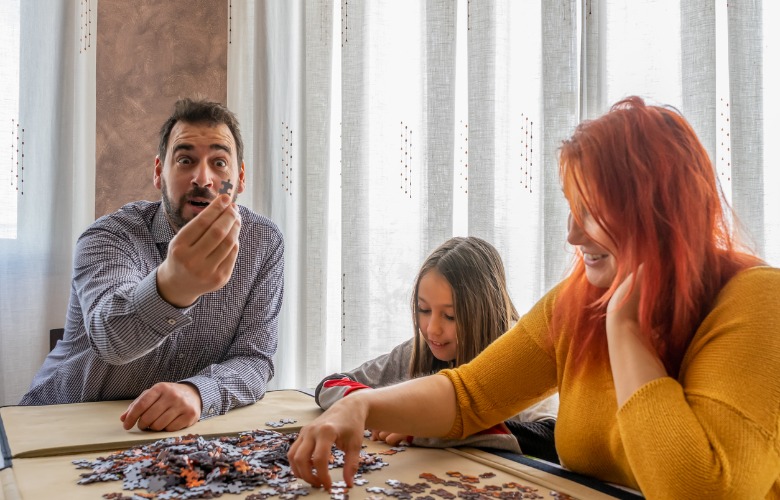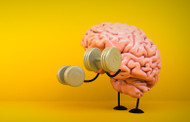Brain Training - Boost Your Cognitive Function
Posted by Jemile Nesimi Hobson, B.A on Oct 11, 2024
As we age, our cognitive skills will become more challenged, but there are ways to train your brain to build and maintain your mental skills. Dr. John N. Morris, director of social and health policy research at the Harvard-affiliated Institute for Aging Research. "Embracing a new activity that also forces you to think and learn and requires ongoing practice can be one of the best ways to keep the brain healthy." Here are ways you can reverse aging by training your brain, including stimulating your brain, mindful practices, physical activity, nutrition, and supplements.

Stimulate your brain
We spend a lot of time exercising our body but what about our brains? Cognitive aging happens, but we can help maintain our cognitive skills and brain function, including memory, focus, and critical thinking, by stimulating our brain.
Brain activities
Mental stimulation has been found to stimulate new connections between nerve cells. This may help generate new cells and help stop loss of cells and develop neurological "plasticity."
Activities that help stimulate the brain include:
- Jigsaw Puzzles
- Word searches
- Sudoku
- Learn a language
- Learn how to play a musical instrument
- Take a class
- Math problems
- Drawing or Painting
- Crafts.
Memory activities that are repeated have been shown to help your brain with receiving, remembering, and thinking. Practice is the focus word here. Also, make sure your brain activity is challenging and complex.
Anti-Aging for your brain with music
According to a John Hopkins otolaryngologist, music stimulates the brain in a way little else does. Playing music keeps the brain engaged while it ages, giving your brain a workout when you listen to music. Listening to music also helps reduce blood pressure, anxiety, and pain while boosting your memory and mental alertness.
Positive thinking
Optimism isn't just nice to have; your brain loves it. Positive thinking can change the chemistry in your brain and brain cells. For example, when we are happy and feel joy, our body lowers cortisol and creates serotonin – this, in turn, allows our brains to be calm, less anxious, focus more, and stabilize our emotions. In addition, positivity impacts the brain's prefrontal cortex, activates it, and heightened cognitive skills like creative thinking, intellectual adaptability, and our ability to process information.
Positive thinking:
- Increases mental productivity
- Improves our thinking skills
- It helps us analyze data
- It helps us solve problems
- Boosts creativity
- Increases our ability to pay attention.

Mindfulness and our brain
Mindfulness isn't just a catchword or trendy thing to do; it has been practiced for thousands of years, and studies show it can help our mental health, including anxiety, depression, post-traumatic disorder.
Here are other ways mindfulness practices improve our brain health:
- Boosts frontal brain activity
- Increases capacity for rational thought
- Increases capacity for intentional planning
- Boosts effective executive functioning
- Increases emotional awareness
- Reduces gray matter
- Lessens fear and anxious arousal
- Supports rest and relaxation
- Linked to relationship satisfaction
- Increases levels of bonding hormones oxytocin and vasopressin
- Improves motivation, attention capacity, and motor control.
Mindful meditation
Mindful meditation has been shown to help change brain structures and activity in regions of the brain that are linked to attention and emotion regulation. In addition, researchers found that people who practiced were less likely to react with negative thoughts in times of stress.
Emotional regulation
As we age, our ability to regulate our emotions improves. Emotional regulation is a simple process that many of us already engage in. Engaging in emotion regulation can help with memory training, attention control, and mental health.
Deep concentration
Have a hobby? That can help you obtain a deep concentration that helps with your brain health and practicing mindfulness. Whether you are painting, building a model, or playing a video game – your brain will be better for it.

Brain health with exercise, sleep, and nutrition
Keeping yourself fit, eating healthy, and getting adequate rest aren't just good for your body; they are suitable for your mind too!
Exercise is good for the brain
Did you know that physical activity can change your brain structure? Exercise can help protect our brain function, boost our memory, and increase our brain volume. This is because research has found that regular exercise, even just walking, can improve our memory function and increase the protein BDNF or brain-derived neurotrophic factor in the bloodstream. Crucial for healthy cognitive function, BDNF changes our brain's ability to change and adapt, cell survival, memory, and develops new neurons in the brain. Exercise also boosts the blood flow, which the brain uses a lot of – up to 15% of our body's supply.
Our brain on sleep
Sleep is essential for many brain functions, including how our neurons communicate with each other. While we aren't sure why we sleep, we know our brain has trouble functioning well without it. Sleep is crucial for forming pathways in the brain, learning, and creating new memories. Without sleep, it isn't easy to concentrate, and our response is slower. Studies also show that during sleep, our body removes toxins in our brain that built up while awake.
Brain food
Eating a diet full of whole foods that contain lots of vitamins, minerals, essential fatty acids, and antioxidants is an excellent approach to brain nutrition. Studies show that diets including the Mediterranean diet and a traditional Japanese diet lower the risk of depression and lower the number of toxins and 'bad' bacteria in your intestines. Allowing your microbiome or "good" bacteria to do its job and reduce inflammation, keep your mind free of brain fog, and help your neurons function correctly. Limiting refined sugars and processed foods is also crucial to brain health.
Foods that support brain health include:
- Fatty fish with omega-3s
- Eggs
- Coffee
- Green tea
- Blueberries
- Turmeric
- Broccoli
- Pumpkin seeds
- Dark chocolate
- Walnuts
- Oranges.
Supplements for your brain
Sometimes life gets busy, and you don't have the time to eat as healthy as you would like. Supplements are perfect for filling nutritional gaps and supporting brain function.
- Omega-3s – Essential Fatty Acids – play a role in sharpening memory, improve mood, and protect the brain from aging.
- Curcumin – the active ingredient in turmeric – crosses the blood-brain barrier, is a powerful antioxidant, improves memory, boosts serotonin and dopamine, and helps new brain cells grow.
- Zinc – is crucial for nerve function, and zinc deficiencies have been linked to Alzheimer's disease and Parkinson's disease.
- Iron – Often, a deficiency of iron results in brain fog and impaired brain function.
- Magnesium – your brain needs magnesium for learning and memory.
- Vitamin C – helps fight free radicals that damage brain cells and supports brain health with powerful antioxidant.
- Green tea – boosts brain function, improves alertness, performance, memory, and focus.

Your gut health and Alzheimer's disease
What is Alzheimer's disease?
While research has not discovered a single cause for Alzheimer's disease, some factors are identified as risks. Alzheimer's disease is a progressive neurodegenerative disease that is a type of dementia affecting memory, behavior, and thinking. As symptoms progressively worsen – people with Alzheimer's find it challenging to do daily tasks. While dementia may seem like a normal part of the aging process, Alzheimer's is not. 60-80% of dementia patients are caused by Alzheimer's – mainly affecting people age 65% and older – 32% are age 80 or older. Also, people under 65 (approx. 200,000 Americans) have an early onset of Alzheimer's disease. Thus, this is not just a disease of the elderly.
Symptoms of Alzheimer's
- Difficulty remembering newly learned information
- Disorientation
- Mood and behavior changes
- Deepening confusion about events, time, and place
- Struggles with routine tasks such as planning, cooking, and dressing
- Unfounded suspicions about family, friends, and professional caregivers
- Ability to make decisions decline
- Repeats statements and questions over and over
- Forgets conversations, appointments, events
- Misplaces things
- Gets lost in familiar places
- Forgets the names of everyday objects and family members
- Serious memory loss
- Difficulty speaking, swallowing and walking
- Social withdrawal
- Mood swings, depression, irritability, and aggressiveness
- Sleeping habit changes
Alzheimer's disease and links with gut microbiome
According to a journal article in Frontiers in Cellular and Infection Microbiology, "Significant quantitative and qualitative changes of the gut microbiome have been reported in patients with Alzheimer's disease." Since the gut microbiome can be affected by negative external lifestyle habits – it should be considered for those developing Alzheimer's. In addition, the gut microbiome plays a crucial role in the central nervous system and is known as the "brain-gut microbiota axis" The interaction between the gut and the brain links the digestive, immunity, and nervous system. In turn, the intestinal microbiome influences brain functions.
Fermented foods for gut health
- Foods such as yogurt, kefir, tempeh, miso, kimchi, and sauerkraut are great sources of probiotics.
- An excellent way to improve gut health is to take a prebiotic or probiotic supplement daily.
- Collagen-rich foods include salmon and bone broth. Also, foods such as mushrooms, some dairy, and meats can help your body boost its collagen production. You can also take a collagen supplement and add it to your morning coffee or smoothie.
- L-glutamine is a gut-healing amino acid, known to support a strong intestinal barrier, reduce intestinal permeability, support normal immune function, and reduce the inflammatory response.











